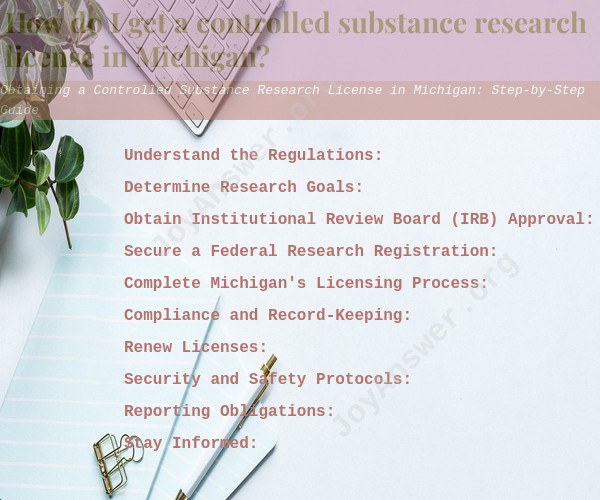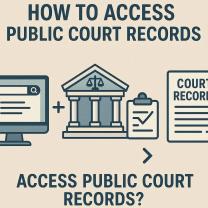How do I get a controlled substance research license in Michigan?
Obtaining a controlled substance research license in Michigan involves several steps and adherence to state and federal regulations. Controlled substances are governed by both state and federal laws, so it's important to ensure compliance with both. Here's a step-by-step guide to obtaining a controlled substance research license in Michigan:
Understand the Regulations:Familiarize yourself with federal and state regulations governing controlled substances. At the federal level, the Drug Enforcement Administration (DEA) enforces the Controlled Substances Act. In Michigan, the Michigan Department of Licensing and Regulatory Affairs (LARA) regulates controlled substances.
Determine Research Goals:Clearly define your research goals and the specific controlled substances you intend to use. Different research projects may require different substances, so understanding your research's scope is essential.
Obtain Institutional Review Board (IRB) Approval:If your research involves human subjects, you'll need to obtain IRB approval from your institution. The IRB ensures that your research is conducted ethically and with the safety of participants in mind.
Secure a Federal Research Registration:To work with controlled substances, you'll need to register with the DEA for a research license. This involves submitting DEA Form 225, the Application for Registration Under the Controlled Substances Act, to the nearest DEA field office.
Complete Michigan's Licensing Process:In Michigan, controlled substance researchers must obtain both a DEA registration and a state license. Follow these steps for the Michigan licensing process:
- Contact LARA: Reach out to the Michigan Department of Licensing and Regulatory Affairs, specifically the Michigan Licensing and Regulatory Affairs Bureau (LARA).
- Obtain an Application Packet: Request an application packet for controlled substances research from LARA.
- Complete the Application: Fill out the application, providing details about your research, the controlled substances you plan to use, and your qualifications.
- Pay Fees: Submit the required application and licensing fees as specified in the application packet.
- Submit to LARA: Send your completed application, fees, and any supporting documents to LARA.
- Wait for Approval: LARA will review your application, and if it meets their requirements, you'll be granted a controlled substance research license.
Compliance and Record-Keeping:Ensure that your research complies with all state and federal regulations. Maintain meticulous records of the acquisition, storage, use, and disposal of controlled substances. Regularly update your license and renew it as required.
Renew Licenses:Controlled substance research licenses require periodic renewal. Be aware of the renewal deadlines and make sure to submit the necessary paperwork and fees.
Security and Safety Protocols:Implement stringent security and safety protocols for handling controlled substances in your research. This includes secure storage, controlled access, and measures to prevent diversion.
Reporting Obligations:Understand and fulfill reporting obligations to both the DEA and the state of Michigan. This may involve reporting changes in your research, handling theft or loss of controlled substances, and reporting to the Automation of Reports and Consolidated Orders System (ARCOS).
Stay Informed:Keep abreast of any changes to regulations, licensing requirements, and best practices in controlled substance research.
It's important to note that this process may vary based on the specific nature of your research and the controlled substances involved. Consulting with legal and regulatory experts in your institution or research organization can be invaluable in ensuring compliance with all necessary regulations and requirements.
Obtaining a Controlled Substance Research License in Michigan
To obtain a controlled substance research license in Michigan, you must submit an application to the Michigan Department of Licensing and Regulatory Affairs (LARA). The application must include the following information:
- Your name, address, and contact information
- The name and address of your research facility
- The types of controlled substances you intend to research
- The purpose of your research
- A description of your research procedures
- A plan for security and disposal of controlled substances
You must also pay an application fee.
Once you have submitted your application, LARA will review it and determine whether to issue you a license. If your application is approved, you will be issued a license that is valid for two years.
The Process and Requirements for Researching Controlled Substances
The process for researching controlled substances varies depending on the type of research you are conducting. However, there are some general requirements that all researchers must follow.
First, you must have a controlled substance research license. Second, you must follow all applicable laws and regulations. Third, you must take steps to protect the safety of your participants and staff.
Navigating Legal and Ethical Guidelines in Substance Research
There are a number of legal and ethical guidelines that must be followed when researching controlled substances. Some of these guidelines are included in the Controlled Substances Act, while others are developed by professional organizations and government agencies.
It is important to be familiar with all of the relevant legal and ethical guidelines before you begin your research. If you have any questions, you should consult with an expert in controlled substance research.
Ensuring Compliance and Safety in Controlled Substance Studies
To ensure compliance and safety in your controlled substance studies, you should develop a detailed research protocol. This protocol should outline your research procedures, safety measures, and data collection methods.
You should also have your research protocol reviewed by an independent ethics review board. This board will help to ensure that your research is ethical and that it meets all applicable legal and regulatory requirements.
Advancing Scientific Knowledge Responsibly in Michigan
Michigan is a leader in controlled substance research. The state has a number of world-renowned universities and research institutions that are conducting important research on addiction, treatment, and prevention.
By following the guidelines and requirements outlined above, you can help to advance scientific knowledge responsibly in Michigan. Your research can help to develop new and more effective treatments for addiction and to prevent substance abuse in the first place.
Here are some additional tips for conducting ethical and responsible controlled substance research:
- Obtain informed consent from all participants.
- Minimize the risks to participants.
- Protect the confidentiality of participant data.
- Publish your research findings in peer-reviewed journals.
- Share your findings with the scientific community and the public.
By following these tips, you can help to ensure that your research is conducted ethically and responsibly, and that it makes a positive contribution to the scientific community.












